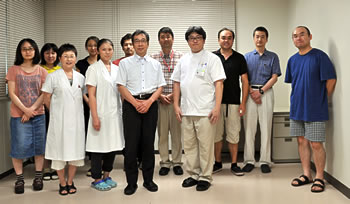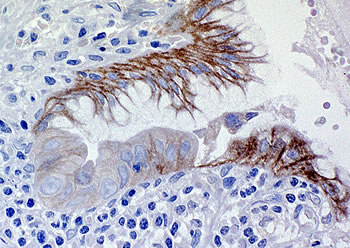Summary
 In higher organisms, numerous cells serve as constituents of the different tissues. To operate successfully within the context of the organisms, all cells must be integrated into an architectural and signaling framework in each tissue and must respond to commands at any given time to maintain homeostasis. In this process, cell-stroma and cell-cell interactions are critical, and failure results in a spectrum of disorders, including neoplasm. Ample evidence indicates that normal microenvironment suppresses tumorigenesis even in the presence of strong oncogene expression. On the other hand, in an established cancer tissue, interaction between cancer cells and stromal elements is important determinant of malignant phenotypes. Our primary interest focuses on how pathological interdependency between cancer cells and host stromal cells is established in cancer cell microenvironment and facilitates cancer progression.
In higher organisms, numerous cells serve as constituents of the different tissues. To operate successfully within the context of the organisms, all cells must be integrated into an architectural and signaling framework in each tissue and must respond to commands at any given time to maintain homeostasis. In this process, cell-stroma and cell-cell interactions are critical, and failure results in a spectrum of disorders, including neoplasm. Ample evidence indicates that normal microenvironment suppresses tumorigenesis even in the presence of strong oncogene expression. On the other hand, in an established cancer tissue, interaction between cancer cells and stromal elements is important determinant of malignant phenotypes. Our primary interest focuses on how pathological interdependency between cancer cells and host stromal cells is established in cancer cell microenvironment and facilitates cancer progression.
Research Projects
 Roles of pericellular proteolysis in cancer progression.
Roles of pericellular proteolysis in cancer progression.
Regulation of protease activity on the cellular surface is one of the most important mechanisms to control the quality of pericellular microenvironment. The aim of this project is to reveal the significance of cell surface proteolysis regulated by membrane-anchored Kunitz-type protease inhibitors, hepatocyte growth factor activator inhibitor type 1 (HAI-1) and HAI-2, in epithelial homeostasis and cancer progression. Using mutant mouse models generated by our laboratory, cultured cell lines and surgically resected human tumor specimens, critical roles of HAIs in the integrity of normal epithelial tissues and invasive growth of cancer cells will be explored.- Searching for novel biomarkers and therapeutic molecular targets of refractory cancers, such as hepatocellular carcinoma, pancreatic carcinoma and glioblastoma.
Laboratory Techniques
- Histopathological and immunohistochemical evaluation of tumor tissues.
- Generation and analysis of animal models; global and/or conditional knockout mice and tumor susceptibility model mice.
- Molecular and cellar biology and protein biochemistry.
- Cell culture.
Routine Clinical Practice
- Histopathological diagnosis of clinical specimens.
- Autopsy.
Publications
- Ohno A, et al: Aberrant expression of monocarboxylate transporter 4 (MCT4) in tumor cells predicts an unfavorable outcome in patients with hepatocellular carcinoma. Liver Int, 34:942-952 (2014)
- Hoshiko S, et al: Hepatocyte growth factor activator inhibitor type 1 (Hai-1/Spint1) is a suppressor of intestinal tumorigenesis. Cancer Res, 73: 2659-2670 (2013)
- Baba T, et al: Loss of membrane-bound serine protease inhibitor HAI-1 induces oral squamous cell carcinoma cells invasiveness. J Pathol, 228:181-192 (2012)
- Kawaguchi M, et al: Membrane-bound serine protease inhibitor HAI-1 is required for maintenance of intestinal epithelial integrity. Am J Pathol, 179:1815-1826 (2011)
- Cheng H, et al: Hepatocyte growth factor activator inhibitor type 1 regulates the epithelial to mesenchymal transition through membrane-bound serine proteinases. Cancer Res, 69:1828-1835 (2009)
- Nagaike K, et al: Defect of hepatocyte growth factor activator inhibitor type 1/serine protease inhibitor, Kunitz type 1 (Hai-1/Spint1) leads to ichthyosis-like condition and abnormal hair development in mice. Am J Pathol, 173:1464-1475 (2008)
- Fukushima T, et al: Silencing of insulin-like growth factor binding protein-2 (IGFBP-2) in human glioblastoma cells reduces both invasiveness and expression of progression-associated gene CD24. J Biol Chem, 282:18634-18644 (2007)
- Tanaka H, et al: Hepatocyte growth factor activator inhibitor type 1 (HAI-1) is required for branching morphogenesis in the chorioallantoic placenta. Mol Cell Biol, 25: 5687-5698 (2005)
- Itoh, H., et al: Regeneration of injured intestinal mucosa is impaired in hepatocyte growth factor activator-deficient mice. Gastroenterology, 127:1423-1435 (2004)